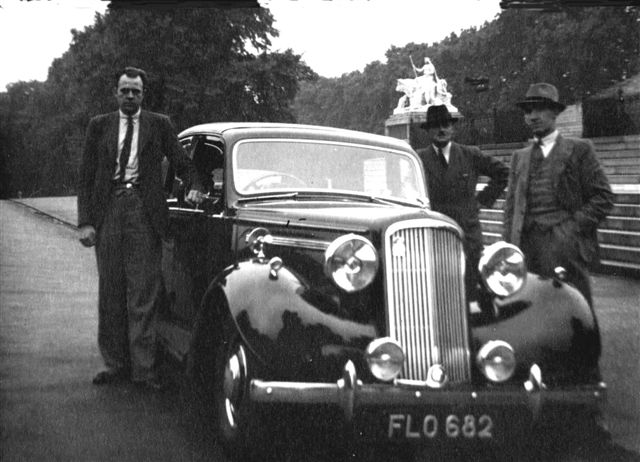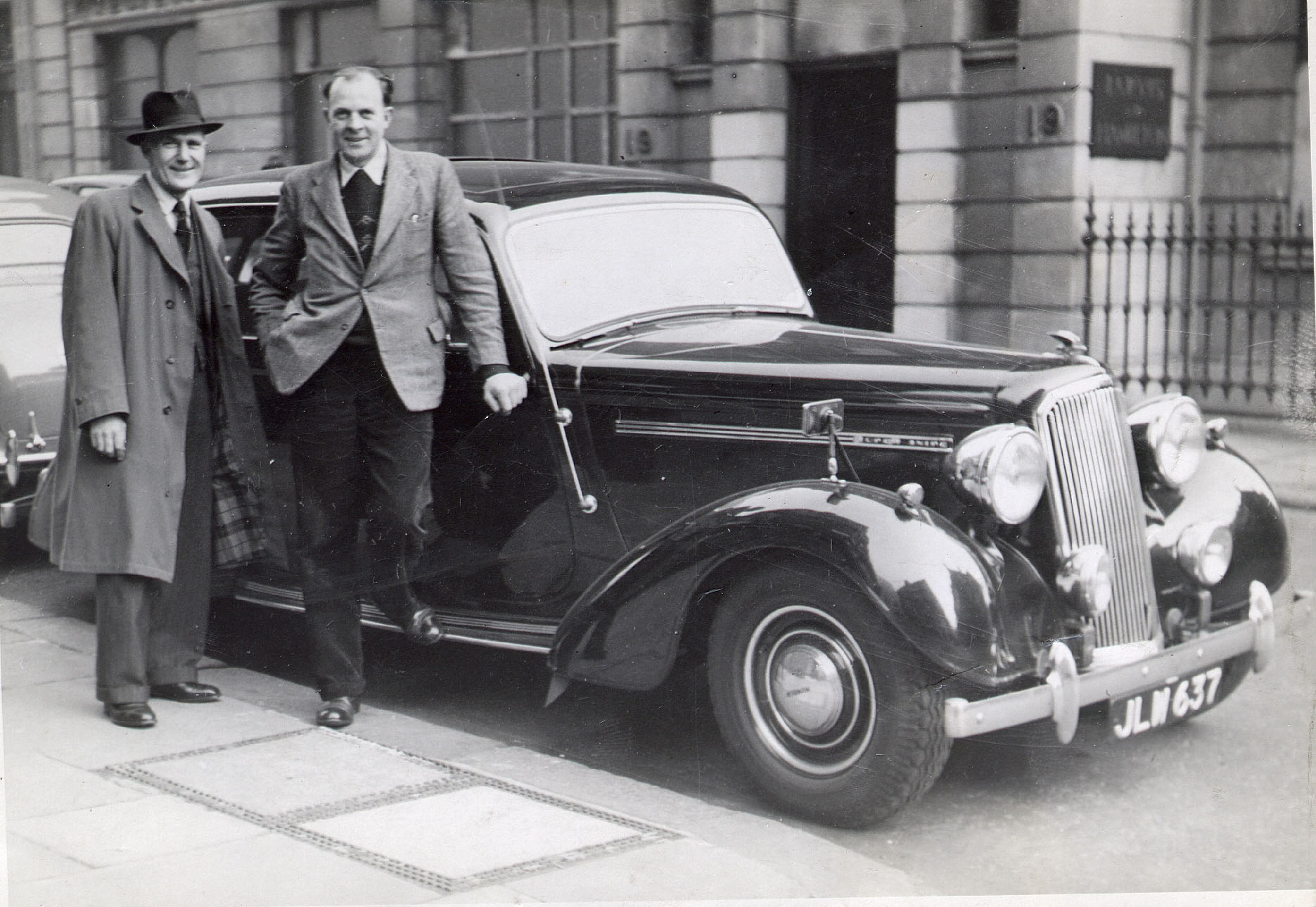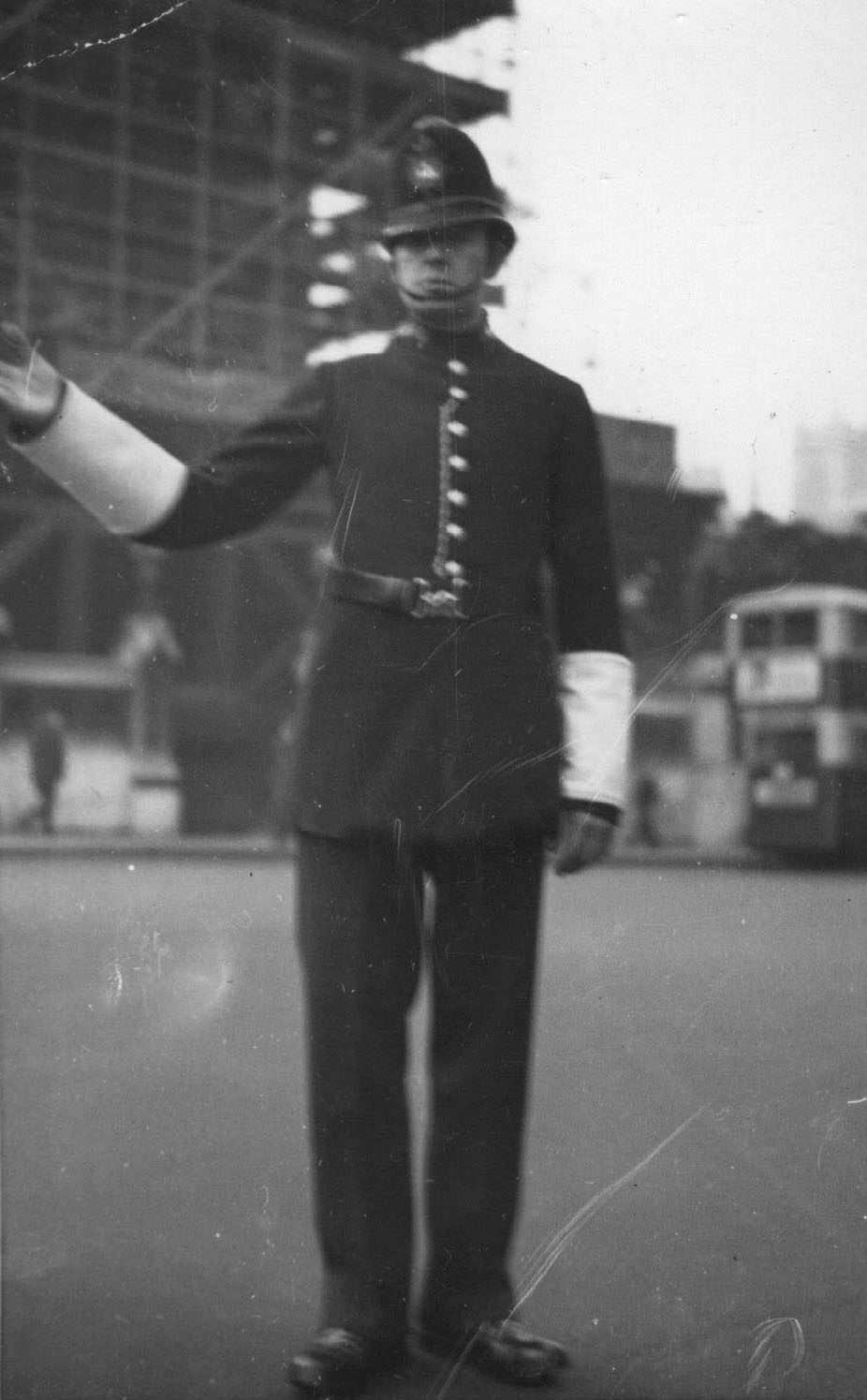 '1Q' pictured near Prince Albert Memorial, Kensington Gardens 1938
'1Q' pictured near Prince Albert Memorial, Kensington Gardens 1938
TEXT BY GEORGE HIMSELF: "With regard to the 2 'Q' car images.
In the following article I make mention
of the fact that I rarely left 'A' Div.
throughout the whole of my service.
The photo of '1Q' is the "B 'Div 'Q' Car
taken in 1938. I am at the drivers door. The other 2
Officers were CID whose names now elude me. The
other photo '5Q' is the 'C' Div 'Q' car that was
taken in October 1956 (one month prior to my
retirement). taken outside 'C' Div. 'Savile Row'
I was the driver by the drivers door. Both cars
patrolled 'A' Div."
|
|
LOCKERS AND BOXING
"Now I really must comment on those
photo's sent in under General A Pictures by Pcs
Bob Holden , Harry Slipper and others. They most
certainly take me back.
Those photo's of the 'Locker' belonging
to Jimmy Titimus was an identical issue to each
of us residing in the Section House. We each had
one allotted for our personal belongings, into
which we had to cram everything, for no other
articles were allowed to be laying around the
cubicle, A suit of clothes were permitted on a
'coat hanger' behind the cubicle door, with
perhaps a photograph and clock on top of the
locker.
I knew Jimmy Titmus well, and his
locker was in the Gym containing his boxing
paraphernalia.
We had a very good gymnasium at AD with a
full size boxing ring, and the Gym size
permitted some very nice competitions to be held,
also a small arms rifle range. The Gym was also
able to hold a large number of'
'Reserve Aids' to AD when any political crowd
demonstrations were in full swing."
|
|
TOILETS AND TRAFFIC POINTS
"The photo of those Whitehall Toilets
sent in by Len Bentley. These are of great
surprise to me.
As you know, I joined AD on 14th
September 1931 and as far as the toilets in
Whitehall outside the ;Scottish Office' are
concerned, I was completely unaware that they had
ever existed, and there was not the slightest
sign of these. The Westminter CC had made a very
good job of filling them in.
The photo of the pointsman at 'Morleys'
Hill takes me back. I had worked this point a
number of times from about March 1932 but I
cannot remember meeting that particular Pc. Do I
detect solid tires on that omnibus?? these went
out about 1927, perhaps this photo is older than
we think.
In my day, there were no traffic point numbers.
All traffic points were known by their locality
names, and this particular point was known as
'Morleys'.
The building in the background was
clearly known as 'South Africa House', with its
name clearly shown over the 'Portico', I had
never known It as 'Morleys 'although I have no
doubt that 'Morleys House' was its original name.
The one thing that was a bit 'Dicey'
about Morleys Point was that it was on a 'down'
gradient. The road surface was laid with the
familiar 'Lignum Vitae' wood blocks, very hard,
oily, and a slippery surface when wet. This
surface was covered with a 'Bitumin' and Gravel
coated surface, but when in need of maintenance
and worn, it was dangerous in the wet, and care
was necessary not to pull up traffic too quickly
other wise one could find an omnibus sliding down
on top off you, in addition horse traffic had to
receive priority. A horse going down could be a
disaster and we always kept traffic running if a
'Horse and Cart' were on the incline.
The 'Morley's' Pointsman worked in
conjunction with the Strand Pointsman who was 'E
' Div (Bow Street). Everything was one way
(Clock Wise) around Trafalgar Square. and there
were 6 Pointsmen controllling traffic, two were
engaged at the N/E.Corner, One at Morleys, one
at the Strand, one at Northumberland Avenue, and
one was at the intersection with Whitehall.
There were 11 other Traffic Points on AD ground, I worked them all in turn.
On one occasion when working the
Northumberland Avenue Point, another Pc (125A
'Yorky Hayes') was working Morleys. 'Yorky' as
his nickname implies was a Yorkshire man was
senior to me by about 6 months, also an inmate
of AD Section House. Having stopped my
Northumberland Avenue Traffic to allow Morleys to
proceed, 'Yorky Hayes' released his traffic and
standing back onto the center refuge he began a
violent 'come on' signal to traffic to hurry
up. This signal was given by a violent movement
of swinging the arms in a beckoning movement, and
this so caused the white rubber traffic gauntlet
to fly off his forearm high into the air to
settle onto the open deck of a passing Omnibus,
with the embarrassed 'Yorky Hayes' observing the
bus containing his gauntlet disappearing down
Whitehall.
Doubling up with laughter I then observed
'Yorky' standing on the running board of a
commandered passing Taxicab also disappearing
down Whitehall in 'Hot Pursuit', The Omnibus
apparently did not stop until reaching Parliament
Street, when 'Yorkey' was able to retrieve his
gaunlet.
We had 11 Traffic Pointsmen on AD,
working 8am-4pm- 12 midnight' Two worked
Whitehall/Parliament Sqare, One at the
intersection of Whitehall/Derby Gate (This was
mainly to facilitate traffic emerging from the
'Yard' and terminated at 8pm) One at 'Horse
Guards Avenue' (he finished at 8pm). One at the
intersection of Whitehall and Trafalfar Square ,
Two at the North East Corner of Trafalgar Square
and Charing Cross Road. One at 'Morleys, and one
at Northumberland Ave. and Trafalgar Square.
`One pointsman worked Victoria Embankment and
Northumerland Avenue, and One worked Victoria
Embenkment and Bridge Steet, with finally one
Pointsman at Marlborough Road and the Mall."
CLICK HERE FOR 'SIGNPOST' (Express Navigation)
The 'Y' FACTOR ETC
"Generally speaking I never really left AD
throughout the whole of my 25 years service. In
April 1934 after transfer to 'C' Division with
the introduction of the 999 System, with
Information Room and the Area Car scheme, I
worked as W/T Operator on both the 'C' and 'B'
Div. Area Car and 'Q Cars both of which also
patrolled 'A' Div' and we frequently took our
refreshment breaks at either 'AD' or 'AR'
canteens. 'Savile Row' (CD) had not been built,
'Vine Street' was CD at that time.
Because of its low density residential
population 'A' Div did not have either Area or Q
Car. this was covered by both 'C' and 'B' Div
cars. I then moved over to 'C.O. Squad' and when
Barnes District Garage opened in 1941 I
transferred to D/T/5/ with the 'Transport
Section' subsequently becoming both M/car and
Traffic Patrol, all of the time still working
either 'A' or 'B' Div or 'Central'.
At the termination of the War in 1945 with
the Transport Section back on the road I
subsequently found myself back onto the 'Q' Cars
again working 'A' then being a good boy on the
Hendon Advanced M/Cycle course became an
original member of the 'Special M/Cycle Escort
Group' and we always assembled at 'AH' so I was
again with 'A'Div'.
The only break away was from about 1942
to 1945 when my knowledge as W/T Operator enabled
me to become more involved into the War effort as
a W/T Operator at a 'Y' (Enemy Interceptor)
station.
Yep, the 'Y' Station was run by the 'Met' but little is known about it.
But that us another story.
After the war, I returned to D.T.5."
G.T. Sharp Ex 149A.'C' 'B' 'D.T.5.' 'CO'
Wt. No. 121517
email: geosharp@xtra.co.nz
CLICK HERE TO RETURN TO 'SIGNPOST' (Express Navigation)
|
 '5Q' October 1956
'5Q' October 1956
"You have a photo of myself somewhere on
file (see below) working the Victoria Embankment/Bridge
Street Point. This was the most difficult point
to work for a single pointsman as it involved
walking from one position to another with
traffic from 3 directions. A probationer was not
allowed to work this point.
On parade time when being posted to your
particular point which was a monthly posting, you
also made sure that you had your rubber traffic
suit (obtainable from the uniform room in the
basement of AD) with you. Failure to do this if
it rained meant you were going to get very wet.
Relief when on point duty (call of nature
etc) came from the man on the beat when he came
round. It was recognised that he never passed the
pointsman without first stopping and drawing the
attention of the pointsman, it was was nearly
always taken up, if only to partake of the usual
'Spit and a Draw'.
In those days before the introduction of
the 999 system, and with the telephone not so
accessible and numerous as it is today, the
public always knew the position of the nearest
traffic pointsman, and it was to him they ran in
times of trouble. If you finished your relief
without a job of some kind, you were fortunate."
|




